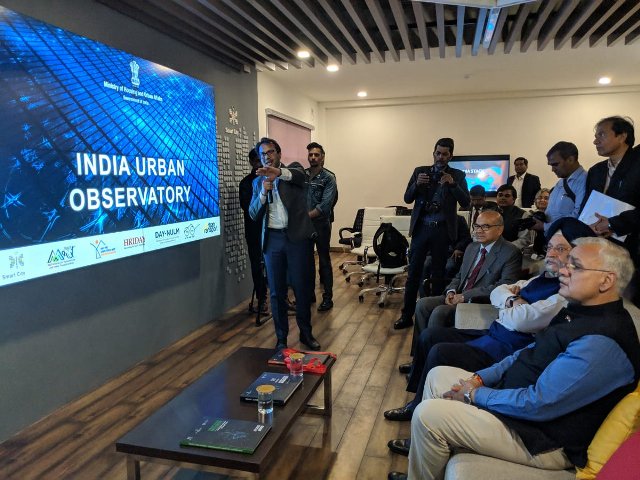Urban Observatory will plug into myriad sources of data from cities: Hardeep S Puri
He said the future of Governance is data-driven and Indian cities are beginning to adopt this change in their functioning.

- Country:
- India
Shri Hardeep S Puri, Minister of State (I/C) for Housing and Urban Affairs, has stated that as cities begin to implement ‘smart’ solutions, data becomes a significant asset and enabler for data-driven Governance, leading to urban transformation. While inaugurating state-of-the-art India Urban Observatory here today, he said that it will plug into the myriad sources of data from cities, both from real-time and archival sources. While inaugurating the Video Wall, he said that it will showcase the insights gained from the Observatory and the various Missions/ offices with the idea to proactively engage with citizens/ visitors in spreading awareness about the various initiatives of the Ministry. Sh Durga Shanker Mishra, Secretary, MOHUA, Sh Kunal Kumar, JS/Mission Director, Smart Cities Mission and senior officers of the ministry were also present on the occasion.
Speaking on the occasion, Shri Hardeep Puri said that it is imperative for the empowerment of communities that cities work on using information available through various sources to improve their functioning, public services, governance systems, achievements and failures in the public domain, thereby, empowering their citizens through the access to information. He said the future of Governance is data-driven and Indian cities are beginning to adopt this change in their functioning. He said, bringing PEOPLE in ‘focus’ needs a move towards outcome-based planning in governance. “The Observatory will help in getting reliable, up-to-date information on a meaningful set of indicators over various domains such as transport, health, environment, water, finance and so on, which will further assist in developing best practices, future strategies and policy interventions as and when required”, he added.
Shri Puri pointed out that the conceptualisation of this Observatory recognizes the value of enhancing engagement among all four stakeholders of the ‘quadruple-helix’ model— Government, citizens, academia, and industry, along with improvements in the internal workflow and decision-making processes of city Governments. He further elaborated that the India Urban Observatory would progressively become the chief data analysis and Management Hub of the Ministry and would enable evidence-based policy formulation, capacity building of ecosystem partners on data-driven governance, foster innovation through development of newer and better use cases thereby enabling solutions at scale and speed. “It will provide a scientific response to the complex challenges to urbanization through use of state-of-the-art technologies and collaborations”, he said.
The India Urban Observatory is an important component of the recently launched Data Smart Cities strategy that envisions to create a ‘Culture of Data’ in cities, for intelligent use of data in addressing complex urban challenges. The strategy aims to lay down the basic premise, three foundational pillars vis. People, Process, Platform, and a suggested roadmap for cities to improve their readiness for intelligent use of data. Making cities ‘DataSmart’ is key to realizing the full potential of technology interventions and innovation ecosystems in cities. (https://smartnet.niua.org/dsc/datasmartcity-stratergy.php). The DataSmart Cities Strategy also presents a Data Maturity Assessment Framework (DMAF), that measures the readiness and evolution of cities in their efforts to implementing the Data strategy. The assessment of cities as per the DMAF will foster a culture of data and drive innovation in India’s Smart Cities through a spirit of collaboration and healthy competition. (https://smartnet.niua.org/dsc/dmaf.php)
(With Inputs from PIB)
ALSO READ
Kerala Transport Corporation's Record-Breaking Income Achievement
Europe's Winter Freeze: Chaos in Transport and Rising Fatalities
Gauteng Logs Strong Festive-Season Transport Enforcement Results
Winter Havoc: Snowstorm Paralyzes Transport in France and Netherlands
Winter Wonderland Woes: Snowfall Disrupts Dutch Transport










